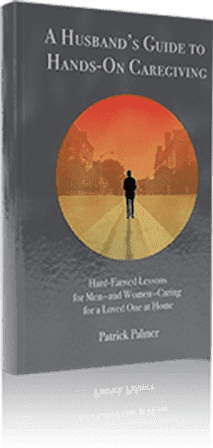A Husband’s Guide to Hands-On Caregiving
“Caregiver,” the Merriam-Webster dictionary defines the word as a person who provides direct care. But is that enough to describe the caregivers who do it for their loved ones? The emotions at play and how much it takes from the person termed as a caregiver aren’t talked about enough.
That isn’t to say the resources don’t exist; there is Support for Caregivers of Cancer Patients and many caregiver books to read. The problem is that many of these resources prepare you for either how to start caregiving or what comes after. A guide to hands-on caregiving needs to cover all parts of caregiving, no matter how ugly it may be. That’s what Patrick Palmer’s A Husband’s Guide to Hands-On Caregiving is all about.
“Caregiving by men can present a different set of challenges compared to women, who are naturally more nurturing.”
This couldn’t be more true, and as a caregiver in that position for years, he pens down his experience and thoughts to help others in similar situations.
A Guide to Caregiving From a Caregiver
A question that goes through many caregivers’ minds was in Patrick Palmer’s as well.
“Why me? What did we do to deserve this?”
It’s not a question one asks about their caregiver role, but when they see their loved ones in pain and can’t help but feel it to their core. You might even feel guilty for asking, “Why me?” but one thing Patrick does well is realizing that he needed to feel his emotions as they were.
Allow Yourself to Feel Your Emotions
“All of a sudden, I did not have anything to look forward to.” Feeling despair, depression, and even anger is completely normal. Instead of burying it away to deal with once your loved one is healed or has passed, find an outlet and let yourself feel those emotions.

Let Your Family and Friends Help
“Some guys may be hesitant to ask for help. Men, the “fixers” in life, all too often feel that they can handle anything.”
Even today, men are expected to be strong and take on the weight of the world on their shoulders. That’s a recipe for draining yourself and resenting your caregiver role. It’s a full-time job, and you need to be prepared for the reality of it but remember, you don’t have to do it alone. Your friends and family love you, and they’ll want to help. Plus, there’s no shame in taking the extended hand and making life a bit easier for yourself.
Let Others in, But Not So Much that They Drain You
“It became necessary to diplomatically tell these few friends that I needed to focus more on my family and less on others.” An experience that most of us don’t talk about is that those around us might not always be helpful. Sometimes you need to keep your distance, so don’t hesitate to ask for it when you need it.
Hire Professional Help, Even If You’re the Primary Caregiver
If you can let friends and family help, you can and should also get professional help. Even as a caregiver, there will be things you can’t do on your own or feel too overwhelmed to do. Take your time too to find the right professional help because, as Patrick wrote, “As in all relationships, not everyone is going to be a good fit.”
Don’t Let Your Stubbornness Get the Best of You
In your desire to take care of your loved ones, don’t forget to take care of yourself. The stubbornness will only hurt you and stress you out the longer you do it. Stress is a major trigger and can lead to other health problems. Imagine the impact it can have on your loved ones if they feel it’s because of them.
Grieve Them, But in That Grief, Don’t Forget to Celebrate Their Life
There are many things you have to do when you take care of a terminally ill loved one. You not only have to financially prepare and equip your surroundings to make life easier for them. You also have to take the time to prepare yourself for the inevitable end. But in all this, it’s important not to miss one thing, and that’s to celebrate their life. “After the shock of loss, accept the fact that you will come full circle in the emotions that you experienced when your loved one was still alive.” Use those emotions and celebrate their life, and don’t just grieve their death.

A Husband’s Guide to Hands-On Caregiving is one man’s journey through caring for his wife, dealing with the grief, and learning to move on. Although titled a husband’s guide, it’s much more than that. It is a raw reality for every woman and man, so they can be prepared to be a caregiver to the best of their ability, know the reality of it, and heal as a caregiver, too, so you can remember all the good times and remember them as they were. Patrick Palmer puts it beautifully when he says, “It allows the memory of him or her to last forever.”


